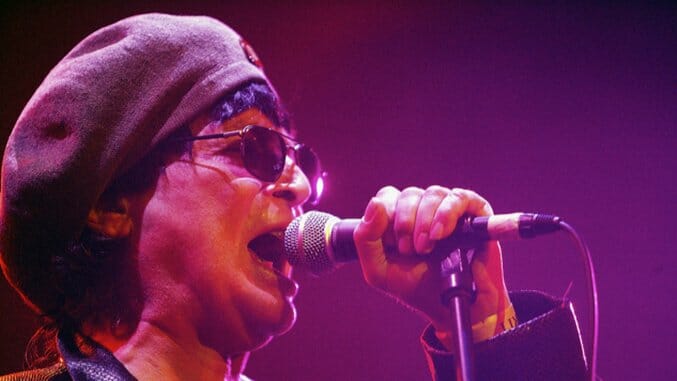Introducing Endless Mode: A New Games & Anime Site from Paste
Alan Vega could be a scary motherfucker. Especially when he was onstage, with a microphone in one hand and occasionally an eight-foot chain from a motorcycle in the other. He glowered at the audience and yelled at them when he wasn’t groaning and shouting and wailing through his songs of existential terror and blushing romance, backed up by an unholy racket of cheap drum machine beats and even cheaper synthesizer melodies. The effect was terrifying and capable of changing the entire mood of a room.
Here’s Vega describing to New York Rocker writer Lisa Jane Persky about what happened at an early gig by his band Suicide:
[This girl] once tried to split her head open. She got drunk and she was dancing and she got crazier and crazier as the gig progressed. Then she just started smashing her head against the wall and I tried to stop her. I finally thought I had her. She was on the ground. I was singing to her on the floor and she just looked…she was bleeding all over the place, she’d split her head. Then she got up and she went at it again. Jumped right up and ran right into the wall. I was full of blood.
Powerful art can have a powerful effect, which Suicide kept seeing at their shows over and over again. Some people didn’t know how to reckon with the relentless drive of “Ghost Rider,” the horror of “Frankie Teardrop,” or the melting beauty of “Dream Baby Dream” and “Cheree.” The static pulse of this music fused together by Martin Rev and given life by Vega turned some souls inside out. And so Suicide often had foreign objects thrown their way or stirred up a chaotic near-riot like the one documented on the infamous “23 Minutes In Brussels” recording.
You’ll find that same sense of danger and mystery and sensuality in the work of many of the folks that influenced Vega: Gene Vincent, Elvis Presley, Link Wray. The folks that were scaring the hell out of America’s parents with their hips and leather clothes and lascivious tunes. But since Suicide unleashed their 1977 debut album, that kind of feeling has been sorely lacking in the rock and pop landscape. Punk and metal encourage aggression, but we all go away friends at the end of the night. Suicide didn’t care if you liked them or loved them. This sound was coming out of them no matter what.
I think that has something to do with Vega’s age when all this started to happen. He was well into his thirties by the time Suicide was playing their first shows. And if there’s a benefit to getting older, it’s the exponential rate at which you stop giving a fuck. He didn’t aim to look cool; he just was cool. It was, and remains, a stark contrast to their carefully coiffed contemporaries. The idea of them touring with The Cars and Elvis Costello just sounds preposterous.
Yet, they gravitated toward Suicide’s energy and dynamism and tantalizing air of uncertainty with just as much fervor as they did towards Vega’s lyrical brilliance. So did Bruce Springsteen, who adopted their approach for “State Trooper,” and later covered “Dream Baby Dream.” Vega and Rev inspired a world of other artists from so many different musical disciplines. We’re still feeling the shockwaves of it reverberating in modern bands like Plague Vendor and Perfect Pussy.
When they split for various stretches, Vega almost never strayed from that same path. His solo records were increasingly fractured and thrilling, like 2007’s Station with its switchblade cover art and chilling rambling. He also brought that same unkempt genius to collaborations with the members of the electronic group Pan Sonic, Psychic TV leader Genesis P-Orridge, and Alex Chilton. Through every project, it felt like there was a spectre hanging just over your left shoulder that you just can’t bring yourself to confront.
We might see the likes of Alan Vega again in some other fearless figure who pulls from the stories and detritus around them to construct unsettling commentaries on our current situation. That’s the goal of so many artists in our world, really. What they’ll be missing out on though is the sheer desperation and that measure of darkness in their soul that no amount of sunlight or praise can wash away.
Robert Ham is a regular contributor to Paste and the author of Empire: The Unauthorized Untold Story, out now via Regan Arts. Follow him on Twitter.
